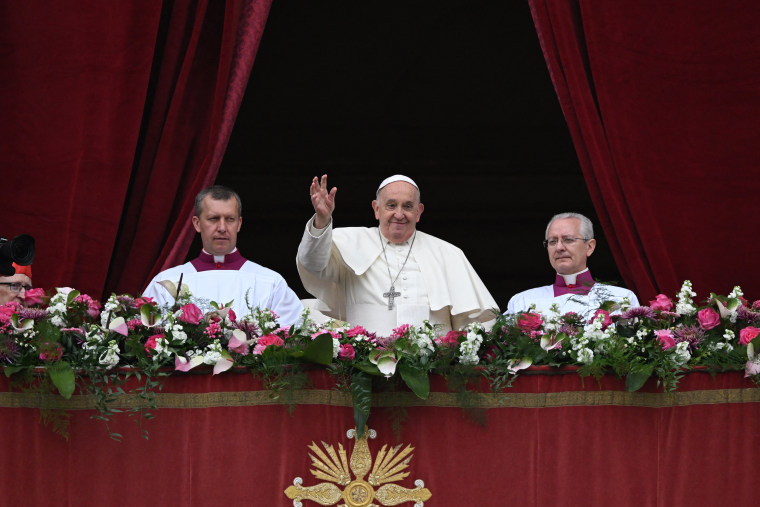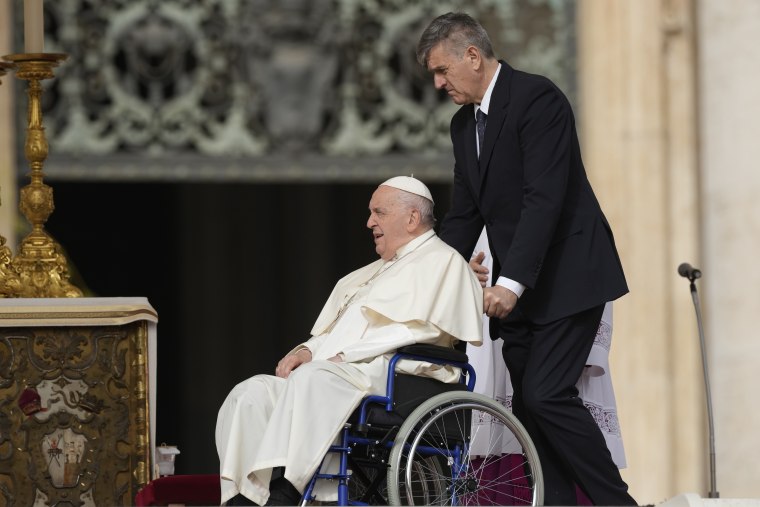Pope Francis appeared on the balcony of St. Peter’s Basilica looking healthy and in good spirits as he waved to crowds gathered for Easter services on Sunday.
For the past few months, the pope has been battling frequent bouts of bronchitis, cold and flu, with regular visits to the hospital for checks on his lungs. Respiratory problems and a chronic cough have often led him to ask his aides to read passages of speeches for him, and cancel private audiences.
And last week, on Palm Sunday, instead of reading the homily as expected, he simply stood over St. Peter’s Square in silence for several minutes, to the surprise and concern of the faithful.
So while Easter week is the most important on the Catholic calendar, this year it has also been a test of Pope Francis’ health. During the delivery of his Urbi et Orbi message, the traditional apostolic blessing and message to the world, the pope’s voice sounded hoarse at times, but improved from previous weeks. He didn’t pause, and he did not cough.

During the address, the pope made a strong appeal for peace around the world, particularly in Ukraine and Gaza. “May the risen Christ open a path of peace for the war-torn peoples of those regions,” he said, following it with a call for an immediate cease-fire in Gaza, increased humanitarian aid, and the release of all hostages taken on Oct. 7.
“Let us not yield to the logic of weapons and rearming,” Francis said. “Peace is never made with arms, but with outstretched hands and open hearts.”
The pope’s Easter message traditionally focuses on world affairs, and he mentioned other flashpoints, including Ukraine, Syria, Lebanon, Armenia and Azerbaijan, Haiti, Myanmar, Sudan, the Sahel and Horn of Africa regions, Congo and Mozambique.
In a month that has seen a terror attack in Moscow claimed by ISIS and escalating hostilities on the border of Lebanon and Israel, the pope also made an appeal to stanch the expansion of violence beyond the current theaters of war: “Let us not allow the strengthening winds of war to blow on Europe and the Mediterranean.”
After the service, Francis took to his open-topped popemobile to greet crowds in the square and the avenue connecting St Peter’s to the River Tiber. The Vatican said about 60,000 people had turned up.
The address, delivered without incident or further indications of poor health, has helped to bolster the observations of those who have downplayed the significance of previous incidents.
“The pope’s decision to abandon the Palm Sunday homily seems to be a spiritual choice, not more,” Deborah Castellano Lubov, a Vatican analyst and contributor for NBC News, said. “It is clear to anyone watching Pope Francis in these years, he doesn’t make decisions based on what others think or what others tell him to do.”
“Concerns that it could be something more worrying didn’t seem to have great foundations, as Pope Francis certainly seemed to be able to recite his appeals at the end of the Mass and circle around afterward greeting the enthusiastic crowds in St. Peter’s Square, before kicking off a grueling Holy Week at full speed,” Lubov said on Sunday, ahead of the pope’s Easter speech. On Saturday night, he presided over the Easter vigil, also without incident.
On Holy Thursday, the pope stuck to the schedule and washed the feet of 12 female inmates at Rebibbia prison in the outskirts of Rome, a tradition meant to emulate Jesus Christ’s washing of his disciples’ feet the night before he died.
Due to his mobility problems, he was forced to sit in a wheelchair, but he was determined to carry out the tradition nevertheless. He also became the first pontiff in history to wash the feet of only women on Holy Thursday.

But then, on Good Friday, the Vatican announced at the very last minute that the pope would not attend the Way of the Cross at the Colosseum “to preserve his health” for Saturday’s Vigil and Easter Sunday Mass. The pontiff, the Vatican said, would follow the event from Casa Santa Marta, his residence, leaving the white seat prepared for him at the Colosseum empty.
This is the second year in a row the pope has skipped the Way of the Cross. Last year, he did not attend as he was discharged from the hospital only a few days earlier, after he was treated for bronchitis with intravenous antibiotics. But while his absence last year was announced with a few days’ notice, the sudden cancellation this year once again raised concerns.
Concerns about the pope’s declining health started in 2021, when he was rushed to the hospital to have part of his colon removed. Then in June 2023, he was once again admitted, without prior notice by the Vatican, for abdominal surgery to remove internal scar tissue.
His mobility problems worsened during the past year due to sciatica and severe knee pain. He began walking with a cane, and more recently has been using a wheelchair. In November, he pulled out three days before a scheduled trip to Dubai to attend COP28 due to a persistent lung inflammation.
The pope’s declining health sparked wild speculation on whether he will retire just as his predecessor, Pope Benedict XVI, did in 2013. But in a recently published autobiography, “Life: My Story Through History,” the pope said, at least at the present, there is “no risk” of him resigning. “I believe the pope’s ministry is for life.” Francis wrote. “I therefore see no justification for giving it up.”
This article first appeared on NBCNews.com.